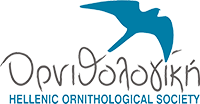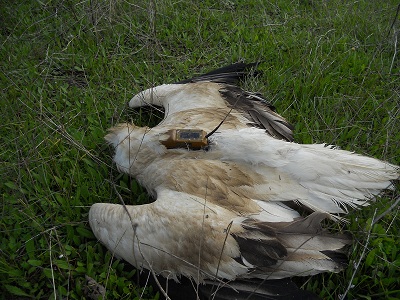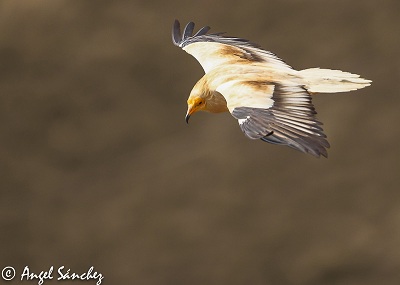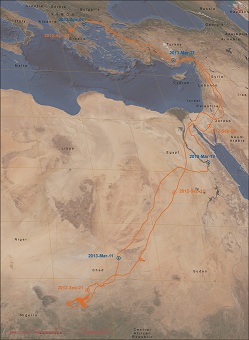Two Egyptian vultures were found dead by poison last Tuesday close to Amfipoli, Northern Greece by HOS researchers. The vultures were on their way to Meteora after their annual migration to Africa to winter in Chad, and had only just arrived to Greece.
The birds were located thanks to the satellite transmitter that “Lazarus” – as one of the two vultures had been named – had been fitted with since last April as part of one of the actions implemented within the framework of a LIFE project for the conservation of the species [1]. Ironically, this same bird had already been saved from poisoning last year thanks to the quick intervention of a local livestock breeder. The transmitter allowed researchers to monitor its migration from Greece to Africa and back home – this last part of the trip had only started in mid March.
But his return back home proved to be ignominious... After having safely crossed over four different countries - Egypt, Israel, Syria and Turkey-, that which proved to be the most dangerous one was Greece as only two days in the country were enough to cut short Lazarus trip to his breeding grounds. He was found dead next to another Egyptian vulture, probably his future breeding pair – his previous pair having also been poisoned during 2012 in Meteora.
Illegal use of poison baits is not new or rare. However, during the last years it has sharply increased once again in the rural areas of Greece. In the recent past, poison has led to the extinction of several protected raptor species from numerous regions of the country, while nowadays it still continues to drastically limit the last remaining populations. Society and public authorities show an alarming indifference to the problem of illegal use of poison regardless of the many efforts and resources that have already been invested in the past to save these species. Two clear examples are the mass poisoning leading to the extermination of the largest colony of Griffon vulture in continental Greece at Nestos Gorge, and the poisoned Black vulture found at Loutra, Evros.
Four severe cases of poisoning of protected species have taken place since the start of 2013: two Great Spotted eagles in Nestos Delta, a wolf in Olympus mountain, a bear and its cub in Grevena and lastly this new case of two Egyptian vultures in Serres.
In the fight against poison, the Greek public authorities have not even appointed a laboratory for toxicological analyses, which is absolutely necessary in order to confirm the cause of death. At the same time, investigations following most of the poisoning events reported by the environmental organizations during the last years have proved fruitless. As regards the protection and guarding of rural areas, they can be characterised, at the very least, as insufficient in a time when the problem has become more acute than ever. The environmental organizations have assessed the problem and submitted their proposals to the relevant authorities, but have received no answer until now.
According to Thanos Kastritis, HOS Conservation Manager: “With less than 20 pairs left in the country, each loss brings the Egyptian vulture closer to extinction in Greece. The illegal use of poison baits shames Greece internationally as it obliterates the efforts to save this endangered species, and also it throws into the rubbish all the money invested by the European Union and other entities in biodiversity conservation. The illegal use of poison baits is still a common practice in the rural areas of our country because the offenders know they will not be condemned. Therefore, we cannot accept any longer the State’s elusions or excuses regarding their inability to identify and punish them”.


[1] Four organizations from three different countries have joined their efforts in the LIFE+ project “The Return of the Neophron” in order to save the last pairs of Egyptian vultures in Greece and Bulgaria. The project is implemented by the Bulgarian Society for the Protection of Birds (BSPB/ BirdLife Bulgaria), the Hellenic Ornithological Society (HOS/BirdLife Greece), WWF-Greece and the Royal Society for the Protection of Birds (RSPB/ BirdLife UK) and is co-funded by the European Commission and the Leventis Foundation.
For more information about the project visit: www.LifeNeophron.eu






